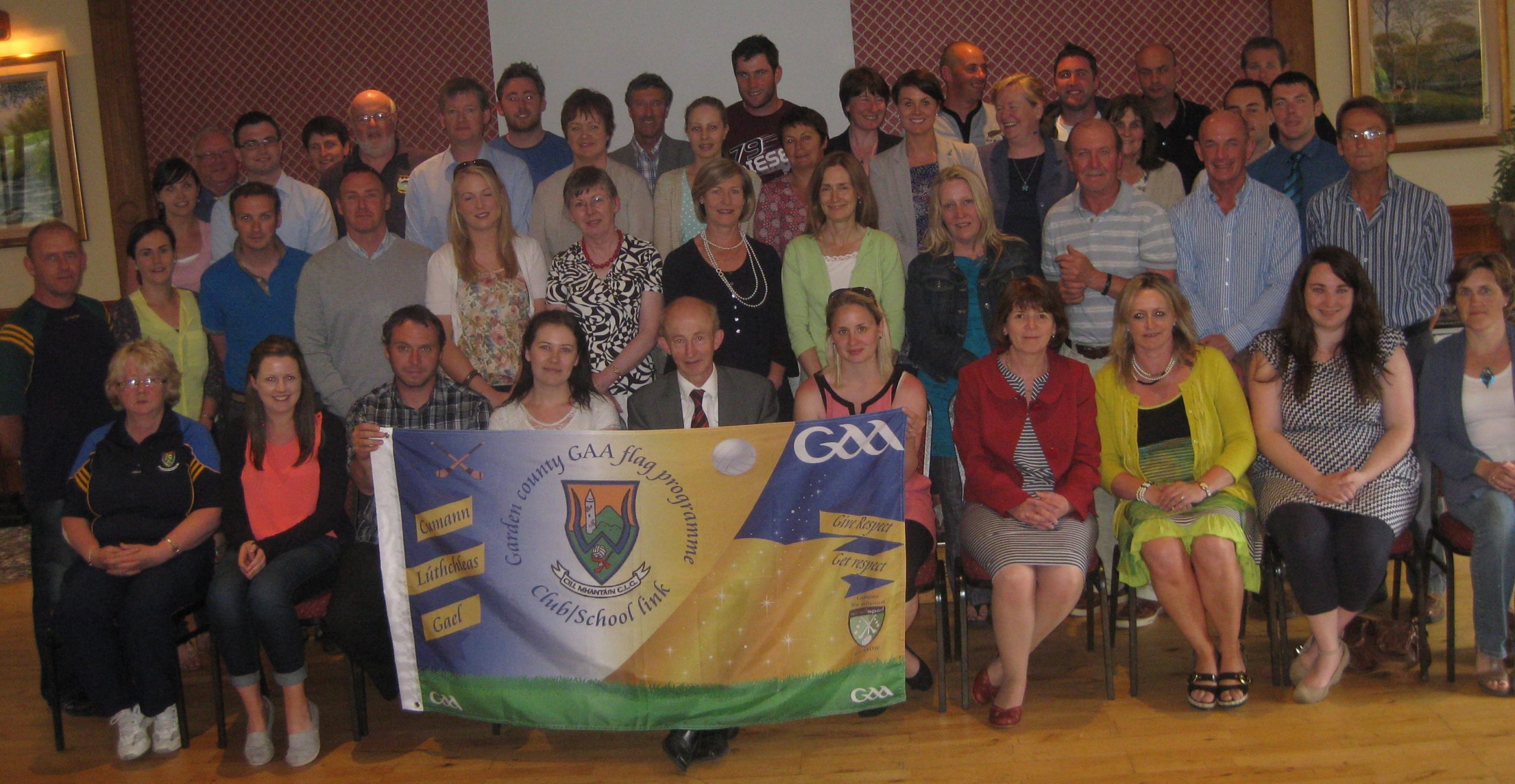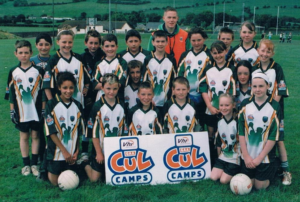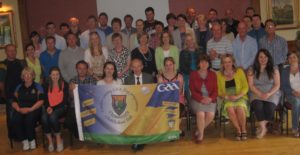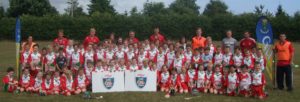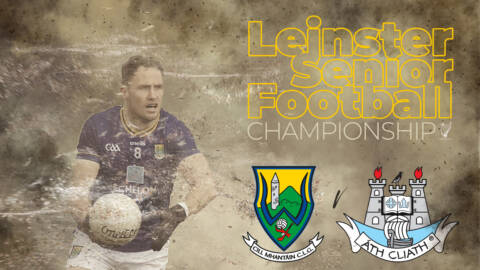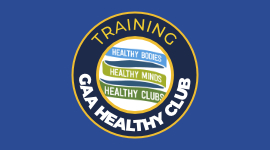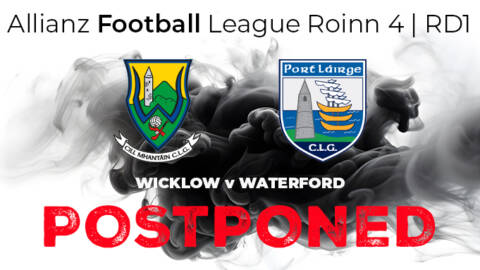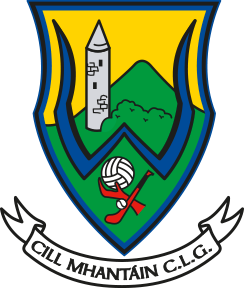I know you will be aware by now of the positive announcement by the Irish Government last week that non-contact underage training in pods of 15 will be permitted from April 26th This is a hugely welcome development and will allow us to finally begin planning on-field activity for the remainder of 2021. However, it should also be noted that these dates are conditional and will very much depend on what happens in terms of the overall COVID-19 picture in the coming weeks.
For that reason, it is more important than ever that no collective training sessions are held between now and the Government indicated return date. Breaches in this context will not only be dealt with under our own Rules but would likely put the broader plan to return to activity in serious jeopardy.
As you will appreciate, we need to receive further clarity from the GAA on aspects of what was announced last week before finalising our plans for a return to training and ultimately games. Hopefully the GAA will outline these details during the week and we can also have a finalised updated versions of our Return to Play documents in relation to the resumption of GAA activity.
Gaelic Games Player Pathway
In order to engage our players and sustain their involvement in Gaelic Games, The Gaelic Games Player Pathway is underpinned by six guiding principles.
- Club is Core
Our clubs are the bedrock of our organisations. They bring communities together and are the vehicle through which our associations have their greatest impact. The pathway promotes the club as the central tenet in the player development process. As a framework, it envisions our clubs as being resourceful and positive environments where players feel valued and supported. Through the proper implementation of our pathway principles, our players will develop over time, a love of place, a connection, a sense of belonging to where they are from
- Player Centred
The Gaelic Games Player Pathway supports a vision of player development that has long-term goals and outcomes which when achieved, equip players to become the best version of themselves, both on and off the field. The framework has many different developmental outcomes ranging from being active for life (through recreational activities) to becoming an Elite Adult Inter-county player. However, the goal of player development in Gaelic Games across all three organisations is one where people will become engaged in our games from a young age, encounter many positive experiences, transition through various phases and ultimately enjoy a sustained involvement over a lifetime. Placing the individual player at the centre of the processes involved in sustaining such involvement is of crucial importance. Our Pathway is very much about empowerment, connection and ensuring that our players feel listened to and feel in control of their own destiny within Gaelic Games.
- Quality Coaching Experiences
The coaches’ role is key in terms of creating environments that will stimulate learning and appropriate player development. Such development by its very nature is about people and how they relate to each other within a co-ordinated and supportive environment. In our context, we are relying on volunteer coaches and teachers to support players and their parents through a journey of guided discovery and learning. For our Pathway to truly be implemented properly, a synergy must be present around the player whereby all stakeholders display a real interest in how they relate to individual players as well as how they as coaches relate to each other (e.g., a shared responsibility for player development within a club or between club, school and academy/development coaches). It is the quality of these relationships that will determine the success or otherwise of The Gaelic Games Player Pathway
- Connection
Throughout the consultation process when constructing the TAPD Report, the committee continuously heard from all stakeholders how various groups and units operated in silos and have very limited integration with each other. The Gaelic Games Player Pathway promotes player development as a shared responsibility between all stakeholders. It supports a vision whereby players reside at the centre of the development process which in turn is enveloped by an environment that is synergised, co-ordinated and supportive. Such environments promote connection whereby stakeholders utilise opportunities for communication, relationship-building and teamwork. It is these relationships, which focus on supporting individual players, that are the cornerstone of the pathway and they provide our volunteers with a sense of self-fulfilment, belonging and identity. It is this altruistic sense of care that ultimately connects our communities to our clubs and our clubs to our people.
- Inclusive
Gaelic Games are for all regardless of age, gender, race, ethnicity, sexuality, beliefs or socio-economic status. Our three organisations are very proud of our traditions, our cultures and our history. The Gaelic Games Player Pathway is very much framed on the many positive elements of our past but also as a framework, it has its eyes very much fixed on our future. Our clubs provide a home for all regardless of abilities; The Pathway is very clear in relation to supporting player development at all levels and in relation to sustaining player involvement and retaining players within our associations. For this to be the case, all players much feel valued and get a sense that they truly belong. This requires huge work from coaches and other stakeholders and can be viewed as our biggest challenge.
- As Many as Possible, for as Long as Possible
This principle of the Pathway is central to achieving sustainability within our three Gaelic Games organisations. The framework supports early engagement in Gaelic sports so that children can acquire fundamental movements skills that will become the foundations for physical activity throughout their lifetime. However, in order to sustain the undoubted positive impact that Gaelic Games has on Irish society and culture, it is vital that we prolong this initial involvement and retain as many people as possible within the Gaelic Games family. By doing so, we are not simply sustaining our Associations, but more importantly, we are nourishing our cultural history and maintaining the lived values that are unique to Irish communities all over the world.
LISTEN
When coaches are talking to their players and providing feedback its imports that coaches listen to what the player has to say. It’s no coincidence that the word LISTEN has the same Letters as the word SILENT. that mean you stay silent and listen what the players has to say.
Kellogg’s GAA Cúl Camps 2021
Our Kellogg’s GAA website is open for booking and places are filling up fast. Some of the larger camps capacity is capped due to Covid 19 regulations and if these are lifted we will open the camps again for further bookings. To Register go to https://www.kelloggsculcamps.gaa.ie
Principles of Play for Attack
Penetration
What does this mean – Advancing the ball towards the goals.
How to explain this to players – “Get the ball moving forward”
Possession
What does this mean – Keeping control of the ball by either holding it up or making simple lateral passes until better options are available.
How to explain this to players – “Hold the ball up until you see a chance to move the ball forward”
Movement
What does this mean – Moving to create space for both yourself and others.
How to explain this to players – “Continuous movement to find space and get the ball”
Principles of Play for Defence
Delay
What does this mean – Positioning of the defender closest to the player with the ball to slow the attack by preventing the ball being moved forward.
How to explain this to players – “Make it hard for the player with the ball to pass or move quickly”
Pressure
What does this mean – Quickly closing down the player with the ball to minimize the time and space in which the ball can be controlled, with the aim of causing a poor decision.
How to explain this to players – “Get close to the player with the ball to pressure and cause a turnover
Cover
What does this mean – Denying passing options to the player with the ball by covering attackers offering support.
How to explain this to players –” If you’re not closest to the player with the ball, your role is to cover the passing options”
Depth Balance
What does this mean – Helping the defence remain compact by closing gaps as they arise (i.e., zone defence or covering angles)
How to explain this to players – Cover free space in front of the player with the ball by maintaining a similar distance between all defenders”
Coach Education
Thanks to all the Clubs and coaches 263 who interacted with our March TURAS Webinars from Nursery – U17. Once we are back on the pitch we will contact the coaches who have completed the online module of the Foundation Award to arrange for the practical session to complete the course.
Easter Skill Challenge
Entries must be received by our closing date on Wednesday, 15th April, after which the winners will be announced on Wicklow GAA social media platforms and the Coaching Corner section of the Wicklow People. Only videos submitted by parents/guardians will be accepted. Video entries can be submitted via What’s app to Hugh Kenny 087-2718537 or Tag Wicklow GAA on Facebook.
Quote of the week:
“Be more concerned with your character than your reputation. Because your character is what you really are, while your reputation is merely what others think you are.”
– John Wooden, Basketball
Three Weekly Coaching Tips:
- Every player is treated the same, every player must have the opportunity to play
- Give an ounce of information and a ton of practice
- Communicate – clearly, concisely, calmly, constructively, consistently and cleverly.
You can contact us:
We are here to help get in touch with Coaching Corner by contacting us at hugh.kenny.gamesmanager.wicklow@gaa.ie if you would like any topic or area covered in more detail in our weekly edition.
15 Coach Profile Questions
Name: Sean O’ Shea
Club: Luke O’ Toole’s
Age Group You Coach: U15 Hurling
- Would you change any of the GAA Playing Rules?
Cynical fouling in hurling has been addressed which will be good for the game. Hopefully, we will get to see more of the genius of Joe Canning, Aaron Gillane and Patrick Horgan playing their skills inside the large rectangle without fear of being pulled down.
- Why did you get involved in coaching?
I played hurling and football all my life and live and breathe GAA. When my eldest daughter started to play at U8 I got involved – that was 13 years ago, my youngest son is now playing at U15, so I will give coaching another few years.
- What is the most rewarding element of being a coach?
To see the smile on the kids’ faces when they win a game and knowing that you helped them achieve their goal.
- What advice would you give to young players?
It is important that young players respect their coaches, their teammates, the referee and their parents, and put a big effort in to schoolwork, Life is not all about GAA and if you respect the people you grow up around you will do well in life; and stay away from drugs.
- What resources do you use to assist you in your role?
I attend coaching courses provided by Wicklow GAA, I watch and learn from other coaches and I spend time watching YouTube clips to help me improve and upgrade my coaching skills
- What does success look like to you?
Success is not all about winning games, but it does help. I like to see the players improving their hurling & football skills, coming out of their shells and gaining confidence and having the craic as they train. For me, if the players keep coming back each week, it means I must be doing something right.
- What do you see as your three main responsibilities as a coach?
- To teach the relevant skills and tactics
- Improve performance by providing instruction, encouragement and positive feedback
- Support and look out for the kids I coach
- How important is winning to you? why?
Winning is not the be all and end all, but it does help. Kids want to win. When you see 5 or 6 young lads bursting their gut and giving you more than 100% you have a responsibility to them as much as you do to their teammates who may not try as hard. So, it is about getting the right balance, you want to push on the strong players, but you also need to bring on and encourage the weaker lads too, otherwise you could see yourself without a team very quickly.
- You have 10 Sliotars & 10 cones in your coaching kit bag. You are in charge of 30 players how would you conduct training to maximise all equipment & player involvement?
For a start I would have 30 Sliotars, one for each player and 2 other coaches. In the 10 sliotar scenario and after the warmup, I could break the players in to 10 groups of 3, the number of cones is immaterial. I would give them plenty of ball work – lifting, striking, catching, soloing, hooking, blocking, keeping the lads moving all the time. I would also break the squad in to smaller groups 7v7 and 8v8 to concentrate on possession and passing off the Hurley, before doing a full-sided game.
- What part of training or games do you dislike the most?
Setting out cones for drills. Sometimes I think we are gone drill crazy.
- What does a normal coaching week look like for you and the team?
Pre-season in hurling would involve training 2 days a week and during the season 1 training session and 1 match, to allow time for the players to train for football too. We must respect the fact that most of the players will be doing other sports other than GAA and will want time at these also.
- Why is planning your coaching sessions so important?
If you arrive at a training session and you don’t have a plan, you will be found out very quickly. Players respect a coach who turns up on time, is dressed in training gear and knows what he/she is doing. I have seen poor coaching and it is not pretty, in fact it is very disrespectful to the player’s you coach.
- Why is feedback so important to player development?
Players of all ages want to hear positive feedback. Even if a player makes lots of mistakes and you tell the player that in fact, he did this right and he has improved on that, it encourages them to keep trying, to keep playing. Positive feedback leads to positive thinking and it will encourage players to work on their skills in their own time. You must remember players develop at different stages. I have seen the strong kids at U7, and I have seen the weak kids at U7, it is unbelievable the change by the time they reach U17, rolls can and are often completely reversed.
- If one of your players is constantly overplaying the ball how do you get the player to correct this?
You need to have a chat and explain to the player that he is playing a team sport and he needs to bring his teammates in to the game more. Every time he overplays the ball, he is drawing 2 or 3 players towards him, if they know he is not going to pass then he is an easy target to tackle and will more than likely lose the ball to the opposition. If he gets this, then maybe the next time he draws in a few players he will pass the ball off to a teammate and set up a valuable score. It is important that player learn to vary their game to keep the opposition thinking.
- Explain how you have kept up to date with coaching methodologies and tactics?
About 10 years ago I completed a Level 1 hurling and Football Coaching course in the same year. I returned to do the Level 1 hurling course again 3 or 4 years ago to see how things had changed. On top of this I try to attend 2 or 3 practical training sessions held by Wicklow GAA each year. I also watch plenty of hurling and football games and listen to the analysis afterwards, one last thing is YouTube and the wealth of information that can be got from watching so many GAA coaching sessions online.
By wicklowpro Wed 7th Apr
